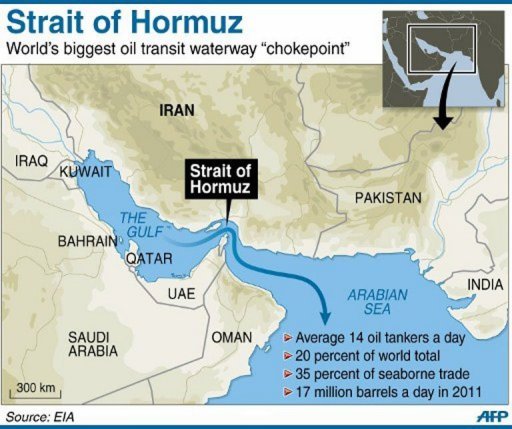Iran will close the strategic Strait of Hormuz at the entrance to the oil-rich Gulf only if its crude revenues are seriously threatened, its top military commander said in remarks reported on Saturday.
Several commanders and officials have vowed that Iran reserves as an option closing the strait — a strategic choke point for much of the Middle East’s oil — if its nuclear facilities are targeted by military strikes.
The threats, renewed repeatedly since December, have generated warnings from the United States, which says any attempt by Iran to close the waterway is a “red line” that would trigger a US military reaction.
But, he explained, “the order to carry out the mission will only come from a decision by the Supreme National Security Council and approved by Supreme Leader” Ayatollah Ali Khamenei, who has final say on all state matters.
Firouzabadi said statements by military commanders would not affect any decision to close the passage of oil through the Strait of Hormuz.
Such threats have regularly caused hikes in oil prices across the globe.
Experts believe Iran, which exports all of its oil from its terminals in the Gulf, would be the first victim of any disruption of crude through the channel.
The issue gained momentum this week as more than third of lawmakers in Iran’s parliament backed a bill calling for the waterway to be closed to oil tankers headed to Europe, as retaliation for a European Union embargo on Iranian crude that came into effect on July 1.
The EU measure is the latest of a raft of international sanctions designed to pressure Iran to curb its nuclear ambitions, which the West suspects mask military objective despite Tehran’s repeated assertions of seeking only the civilian applications of the technology.
The bill echoed a December warning by Iran’s first vice president, Mohammad Reza Rahimi, that the Islamic republic would close the strait if its crucial oil revenues are affected by Western sanctions.
His warning was then followed by naval manoeuvres of the elite Revolutionary Guards practising shutting the waterway in January.
The US has also moved new forces into the Gulf to support anti-mine operations in the Gulf to keep the strategic waterway open, the US Navy said Friday.
Iran has also warned it will respond to any military strikes against its atomic facilities.
The United States and Israel say “all options” remain on the table if talks aimed at curbing Iran’s nuclear activities, condemned in four sets of sanctions imposed by the UN Security Council, fail.
World powers and Iran revived negotiations over Tehran’s nuclear programme this year, but seem to have reached an impasse after three rounds of talks, as differences in the negotiating positions of the two sides remains significant.

COMMENTS
Please let us know if you're having issues with commenting.